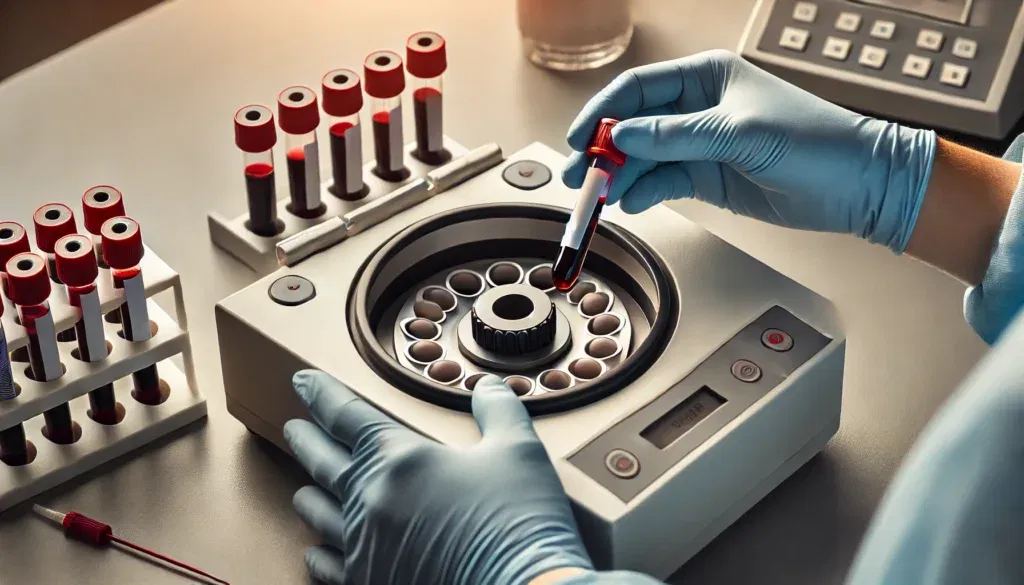Understanding Hormone Blood Tests and Their Importance
Hormone blood tests play a crucial role in diagnosing and monitoring a wide range of health conditions. These tests measure the levels of various hormones in the blood, providing valuable insights into endocrine function, metabolic balance, and reproductive health. Many people seek hormone blood tests to evaluate symptoms related to fatigue, weight gain, mood changes, or reproductive issues. The accuracy and efficiency of these tests depend on multiple factors, including the specific hormones being measured, laboratory processing time, and the complexity of the analysis required.
You may also like: How to Get Your Testosterone Levels Checked: Best At-Home and Lab Testing Options
The human body relies on hormones to regulate essential functions such as metabolism, mood, energy levels, and reproductive health. Even a slight imbalance in hormone levels can lead to significant health issues, making timely and accurate testing essential. When a healthcare provider orders a hormone blood test, they may be investigating conditions such as thyroid dysfunction, testosterone deficiency, estrogen imbalance, adrenal fatigue, or insulin resistance. The results of these tests can help determine the best course of treatment, including hormone replacement therapy, dietary changes, or medical interventions tailored to the patient’s needs.
Many patients wonder, “How long does hormone blood work take?” or “How long does a hormone blood test take?” The processing time for these tests depends on several variables, including the laboratory’s workload, the complexity of the test, and whether specialized testing is required. While some hormone tests provide results within hours, others may take several days to process. Understanding the factors that influence these timelines can help patients set realistic expectations and plan their healthcare journey accordingly.

Factors Affecting Hormone Blood Test Processing Time
The time it takes to receive hormone blood test results varies widely based on several key factors. The complexity of the test, laboratory processing procedures, and logistical considerations all play a role in determining how quickly results become available. One of the most significant factors influencing test processing time is the type of hormone being analyzed. Some hormones, such as cortisol or thyroid hormones, are routinely tested and may yield results within 24 hours. In contrast, more specialized hormone tests, such as those assessing reproductive or adrenal function, may take longer to process due to the need for additional laboratory techniques.
Another factor affecting processing time is the laboratory’s workload and efficiency. Large commercial laboratories that handle high volumes of tests may have automated processes that accelerate turnaround times. However, during peak periods, such as flu season or pandemic-related surges, laboratories may experience delays. Additionally, some hormone tests require specialized equipment or manual analysis, which can extend processing times. If a test requires confirmatory testing or additional sample preparation, this may add days to the total wait time.
The method of sample transportation also plays a role in determining how long hormone blood tests take. If a blood sample is collected in a healthcare provider’s office and shipped to an external laboratory, transit time may add a day or more to the overall processing time. Some clinics have in-house laboratories capable of running standard hormone tests, which can expedite results. Patients seeking rapid results should inquire whether their healthcare provider offers same-day or expedited testing options for specific hormones.
Common Hormone Blood Tests and Their Typical Processing Times
Hormone blood tests vary in complexity and purpose, and their processing times reflect these differences. Some of the most commonly ordered hormone tests include thyroid hormone panels, testosterone levels, estrogen and progesterone assessments, cortisol testing, and insulin evaluations. Understanding the expected processing time for each test can help patients manage their expectations and plan follow-up appointments accordingly.
Thyroid hormone tests, which measure levels of thyroid-stimulating hormone (TSH), free T3, and free T4, are among the most commonly performed hormone tests. These tests are typically processed within 24 to 48 hours, as they are standard panels that most laboratories handle daily. Testosterone testing, frequently used to assess male and female hormone balance, usually takes between 24 hours and three days, depending on the testing facility and whether additional hormone assessments are required.
Reproductive hormone panels, including estrogen, progesterone, and luteinizing hormone (LH) tests, may take slightly longer to process, ranging from two to five days. These tests are often used to evaluate menstrual irregularities, fertility concerns, or menopause-related symptoms. Cortisol testing, which assesses adrenal gland function, may require special collection procedures, such as multiple blood draws throughout the day, leading to processing times of three to five days. Insulin testing, crucial for diagnosing insulin resistance and metabolic disorders, usually takes between 24 and 48 hours to complete.
Expedited Testing Options and When to Expect Delays
For patients requiring urgent results, some laboratories offer expedited testing services. These services may include same-day or next-day turnaround for specific hormone tests, though they often come at an additional cost. Rapid testing options are typically available for standard panels such as thyroid function tests, testosterone levels, and cortisol measurements. Patients interested in expedited testing should inquire whether their healthcare provider or laboratory offers this service and whether it is necessary for their medical condition.
While many laboratories strive to process tests efficiently, certain factors can lead to delays. One common reason for extended processing times is the need for confirmatory testing. If initial results fall outside the normal range, the laboratory may perform additional analyses to ensure accuracy before releasing the final report. This is particularly common in hormone testing, where slight variations in levels can have significant clinical implications. Additionally, laboratories may experience delays due to reagent shortages, equipment malfunctions, or staffing shortages, all of which can extend processing times.
Patients undergoing specialized hormone testing, such as genetic hormone receptor analysis or rare endocrine disorder panels, should anticipate longer wait times. These tests often require highly specialized equipment and expertise, leading to processing times of up to two weeks. If a patient’s healthcare provider suspects a complex endocrine condition, they should discuss expected processing times and potential delays with the laboratory conducting the test.
Understanding Your Test Results and Next Steps
Once hormone blood test results are available, patients should schedule a follow-up appointment with their healthcare provider to review the findings. Interpreting hormone test results requires an understanding of normal reference ranges, individual health history, and potential contributing factors such as medications, lifestyle habits, and underlying medical conditions. A physician or endocrinologist can explain what the results mean in the context of the patient’s overall health and recommend appropriate next steps.
If hormone levels fall outside the normal range, further testing may be necessary to confirm a diagnosis or determine the underlying cause of the imbalance. For example, an abnormal thyroid hormone result may prompt additional testing for autoimmune thyroid disorders, while low testosterone levels might lead to further evaluation of pituitary gland function. In some cases, lifestyle modifications, dietary changes, or targeted hormone therapies may be recommended to restore hormonal balance.

Frequently Asked Questions (FAQ) About Hormone Blood Tests
1. How do they test for hormone levels, and what can I expect during the process?
Hormone levels are typically assessed through a blood sample, though in some cases, saliva or urine tests may also be used. When performing a hormone blood test, a healthcare professional will draw blood from a vein, usually in the arm, and send it to a laboratory for analysis. The laboratory measures specific hormone concentrations, helping doctors diagnose conditions such as thyroid disorders, reproductive health issues, and adrenal imbalances. How do they test for hormone levels accurately? Advanced techniques such as enzyme-linked immunosorbent assay (ELISA) and liquid chromatography-mass spectrometry (LC-MS) are commonly used for precise measurements. These tests ensure that even slight hormonal imbalances are detected, allowing for targeted treatment plans tailored to individual needs.
2. How long do hormone blood tests take to provide results?
The time it takes to receive hormone blood test results can vary based on the type of test and the laboratory’s processing capacity. In general, how long does hormone blood work take? Basic hormone tests, such as those for thyroid function or cortisol levels, may take 24 to 48 hours. More complex panels, like those measuring reproductive or adrenal hormones, can take up to a week. Factors such as lab workload, specific testing methods, and the need for additional confirmation tests can also influence how long does hormone blood test take. Patients should consult their healthcare provider to get a more accurate estimate of their specific test’s turnaround time.
3. Why does the hormone blood test processing time vary between laboratories?
Hormone blood test processing time depends on several factors, including the type of test, the laboratory’s technology, and logistical considerations. Some labs prioritize high-demand tests, allowing for quicker results, while others may need to send samples to specialized facilities for complex analysis. Additionally, variations in sample handling, storage conditions, and batching methods impact how long do hormone blood tests take. Laboratories using automated analyzers can process samples faster, whereas manual testing methods may take longer. If speed is a concern, patients should ask their provider if expedited testing is available.
4. Can certain medications or lifestyle choices affect how long does hormone blood test take?
Yes, medications such as birth control, steroids, and thyroid supplements can influence hormone levels and may require additional verification, extending the hormone blood test processing time. Certain lifestyle choices, like fasting, exercise, and stress levels, can also impact hormone fluctuations, necessitating repeat testing. Additionally, some tests require specific timing, such as morning cortisol measurements, which can affect how long does hormone blood work take. To ensure accurate results, patients should follow pre-test guidelines and disclose any medications or supplements they are taking.
5. How often should hormone levels be tested for ongoing health monitoring?
The frequency of hormone testing depends on an individual’s health status and medical history. For individuals managing conditions like hypothyroidism or polycystic ovary syndrome (PCOS), regular testing every three to six months may be recommended. Those undergoing hormone replacement therapy or fertility treatments may need more frequent testing to track progress. Understanding how long do hormone blood tests take is crucial for timely decision-making regarding treatment adjustments. Consulting with a healthcare provider helps determine an appropriate testing schedule based on personal health goals and symptoms.
6. Can diet and lifestyle changes impact hormone blood test results?
Absolutely. Diet and lifestyle habits significantly influence hormone levels, potentially affecting test outcomes. Consuming a diet high in processed foods, refined sugars, and trans fats can contribute to hormonal imbalances. Conversely, maintaining a nutrient-dense diet rich in healthy fats, fiber, and lean proteins can support optimal hormone production. Understanding how long does hormone blood work take allows individuals to plan necessary lifestyle adjustments in advance of testing. Engaging in stress-reducing activities like meditation and regular exercise can further improve hormonal balance and overall well-being.
7. What are the implications of delayed hormone blood test results?
Delays in receiving hormone blood test results can impact treatment timelines and medical decision-making. If test results take longer than expected, it may be due to additional verification steps required for accuracy. Knowing the estimated hormone blood test processing time can help patients manage expectations and avoid unnecessary stress. If results are delayed significantly, contacting the healthcare provider or laboratory for an update is advisable. In urgent cases, alternative rapid-testing options may be available to ensure prompt diagnosis and intervention.
8. Are at-home hormone blood test kits as reliable as lab-based tests?
At-home hormone blood test kits offer convenience, but their accuracy can vary depending on the test type and the lab processing the sample. Most reputable kits require a blood or saliva sample, which is then mailed to a certified lab for analysis. However, factors such as improper sample collection, shipping delays, and differences in testing methods can affect reliability. Understanding how do they test for hormone levels in different settings helps consumers choose the most accurate option. For comprehensive hormone assessments, lab-based testing under medical supervision remains the gold standard.
9. What conditions can be detected through hormone blood tests?
Hormone blood tests help diagnose a wide range of conditions, including thyroid disorders, diabetes, adrenal insufficiency, and reproductive health issues. For women, these tests are particularly useful in evaluating menstrual irregularities, menopause, and fertility concerns. In men, hormone testing can assess testosterone levels and detect potential issues like hypogonadism. How do they test for hormone levels in specialized cases? Endocrinologists often use additional diagnostic tools, such as imaging studies or stimulation tests, to confirm findings and develop personalized treatment plans.
10. How can I prepare for a hormone blood test to ensure accurate results?
Proper preparation enhances the accuracy of hormone blood test results. Patients should follow any fasting instructions, avoid caffeine and alcohol before the test, and schedule the test at an optimal time of day based on the hormone being measured. Being aware of how long does hormone blood test take ensures timely planning for follow-up appointments and treatment discussions. Additionally, discussing any current medications or supplements with a healthcare provider helps prevent potential interferences with test accuracy. Following these steps ensures reliable results that support effective medical care.

Final Thoughts on Hormone Blood Test Processing Time
Understanding the processing time for hormone blood tests helps patients manage expectations and plan their next steps effectively. Various factors, including the type of hormone being tested, laboratory efficiency, and potential confirmatory testing, influence how long it takes to receive results. While many standard hormone tests yield results within a day or two, specialized tests may take longer, especially if additional analysis is needed. Patients can expedite the process by choosing laboratories with in-house testing capabilities or opting for express services where available. Regardless of processing time, discussing results with a healthcare provider is essential for accurate interpretation and effective treatment planning. By staying informed and proactive, patients can make better healthcare decisions and ensure their hormonal health remains balanced and optimized.
testosterone testing turnaround time, thyroid function blood test duration, hormone panel processing speed, reproductive hormone test results time, adrenal hormone analysis time frame, insulin resistance test timing, blood sample processing for hormone levels, endocrine function test duration, how quickly are hormone tests processed, lab testing for hormone imbalances, wait time for testosterone blood test, estrogen and progesterone test results speed, cortisol level test turnaround, fast hormone test results, delayed hormone test processing, same-day hormone blood work, expedited endocrine testing, factors affecting blood test timing, interpreting hormone blood test results, understanding lab turnaround times
Further Reading:
How Long Does It Take to Get Blood Test Results?
How long do blood tests results take?
Hormone Imbalance And Hormone Level
Disclaimer: The information provided in this article is for general informational purposes only. The content does not constitute professional advice of any kind, including but not limited to medical, legal, or financial advice. HisHealthMag and its contributors make no representations or warranties regarding the accuracy, completeness, or reliability of the information presented. Always seek the advice of a qualified professional for any specific concerns or questions you may have. Neither HisHealthMag nor its authors assume any responsibility or liability for any actions taken based on the information provided in this article. The views and opinions expressed are those of the author(s) and do not necessarily reflect the official policy or position of HisHealthMag.





